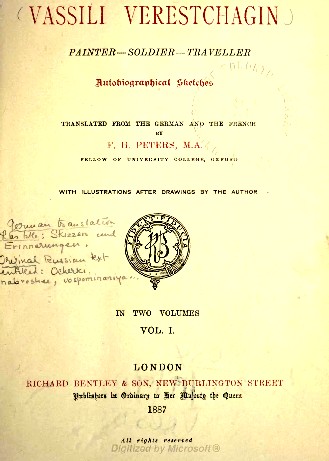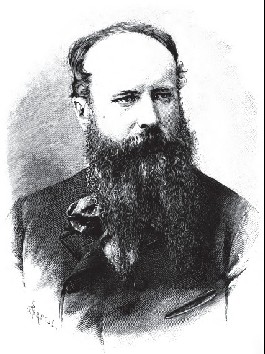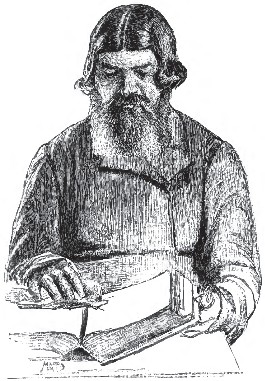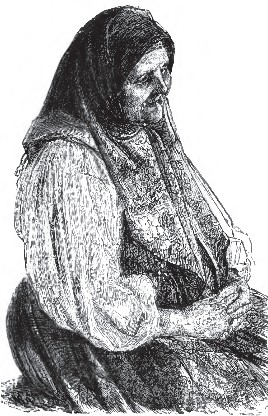1865 Caucasus Molokane and Leapers |
||||||||||||||||||||||||||||||||||||||||||||||||||
Eye-witness report by Vassili V. Verestchagin
Introduction 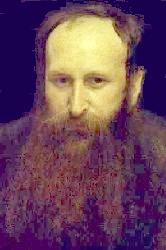 Vasilii Vasilievich Vereschagin (Russian:
Василий Василиевич Верещагин 1842-1904) was the most
famous Russian war-battle painter and the first Russian
artist to be widely recognized abroad. Vasilii Vasilievich Vereschagin (Russian:
Василий Василиевич Верещагин 1842-1904) was the most
famous Russian war-battle painter and the first Russian
artist to be widely recognized abroad. He was born into a wealthy noble family on a large estate between Moscow and St. Petersburg. Hoping to produce an officer or diplomat, his parents sent him to a St. Petersburg military school at age 8, a naval school at age 11, and travel at age 17 in 1858. But, his real passion was for art which he studied in night classes. His military classmates considered being an artist “lowly.” After graduating top in his military class in 1860, he enrolled full-time at the St. Petersburg Academy of Arts. His parents were outraged and would not support his art studies. V.V.V. did not like Classical art nor how Realism art was taught at the best art schools in St. Petersburg and Paris. He had a passion for excellence and even destroyed his first award winning painting. In search of new “objects of Nature” he traveled to the newly conquered exotic Caucasus, where he made a series of sketches and studies, devoted to the life and customs of the local peoples. From ages 21 to 23, he visited the Caucasus twice (1863, 1865) where, among many other peoples and places, he met, illustrated and reported on Spiritual Christians (sectarians) — Molokane, Pryguny, Dukhobortsy, and Subbotniki. In 1863 V.V. Vereshchagin visited the Doukhobor and Molokan village of Slavyanka, Elizavetpol Governante, founded in 1844 by Doukhobors relocated from Sloviansk (Donetsk Oblast, Ukraine). He probably met a village leader Vasili Verigin who was father of the then 4 year-old future Doukhobor leader Peter V. Verigin. In 1866 his illustrations of Doukhobors were shown in Paris. Vereshchagin’s report about Doukhobors with illustrations is posted as The Dukhobortsy, 1863, by Jon Kalmakoff, Doukhobor Genealogy Website. For 40 years V.V.V. recorded much of Europe, Asia and the Middle East like a cultural and war correspondent — drawing, painting, and writing. He was a pacifist- soldier. Because he painted the ugly side of war, he was censored — ordered to destroy some of his work for “lack of patriotism,” therefore many of his images were never printed or exhibited. V.V. Vereshchagin was killed at sea in the Russo-Japanese War at age 62. In 1904, he boarded the battleship Petropavlovsk leaving Port Arthur, Manchuria, into the Yellow Sea where it hit mines and sank. Vereshchagin's passion for excellence and truth in reporting with pictures motivated the conditions from which he found Spiritual Christians, and directed his career. For that we are deeply thankful for his eye-witness reports and 10 pictures (7 of Doukhobors, 2 Molokane and 1 Prygun). Though the oral histories of Spiritual Christians forgot Vasilii Vasilievich Vereschagin, his archived work preserved them. In 1895, 32 years after his visit to Slavianka, Doukhobors burned guns there, 1 of 3 such simultaneous events . V.V.V. was alive when his early Realism art subjects, the Doukhobors, would also become famous pacifists. The world-wide publicity of the protests resulted in one-third of all Doukhobors, the most zealous, being resettled in Canada, organized by the Society of Friends in London, England, and less than 1% of all other Spiritual Christians following them, but most diverted to California by P. A. Demens. The annual end of June memorial for the 1895 burning of guns is the most revered event for all Canadian Doukhobors, who variously call it Petro dien, Peter's Day, Day of Love after Peter V Verigin who ordered the destruction of weapons of war. V.V.V. sources used for the above introduction. The following is the section about Molokane and Pryguny (Leapers) from the book Vassili Verestchagin: Painter- Soldier- Traveler, 1887, enhanced with with notes, links and maps. 3 non-Doukhobor Spiritual Christian (Molokane, Prygun) images were published from his sketchbook while he was at Novo-Saratovka village. These are the first images known to exist of the villagers. They provides a rare first-hand, eye-witness account of this time and place with conversation quotes. Whether more sketches may exist in his sketchbook is not known. Novo-Satrtovka village was founded in the 1850s by Spiritual Christian originally from Saratov Oblast, Russia, whence its name "New Saratov." In 1844, these Spiritual Christian peasants were fist moved from their home village of Batayevka (now in Astrahan Oblast due to changes in borders) to a new Saratovka village in Tiflis Governorate, then moved again in 1850 to this area in Elizavetpol Governorate. The village population has remained constant at about 2000 people for over a century. British spelling is retained. Spiritual Christian labels are in bold for easy recognition. Vassili Verestchagin: Painter- Soldier- Traveler, 1887Notes of a Journey in Trans-Caucasia
Vassili vividly recalled his first visit to Caucasia at age 21. He sketched and wrote notes about a Shiite religious festival in Shusha, Karabakh — 10 days of fasting, solemn worship, self-mutilation, etc. [Present day Nagorno-Karabakh is shown in green on map below.] Next he visited neighboring Duchobortzis [Dukhobors, Doukhobors] in Slavianka village of — 205 houses, 600 men*, 7000 cattle — who resided here for 25 years. [*In Russian census “souls” were counted as “living adult male,” here translated as “men” not counting women or children.] 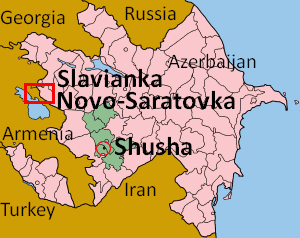 [Pages 69-70 of Vassili Verestchagin: Painter- Soldier- Traveler, 1887] These same Duchobortzis, who glorify God and their faith in this wise, live an honest, reasonable, and prosperous life. These qualities, indeed, they share with other religious communities that have been banished and forgotten, such as the Molokanes, the Subbotnikes, and the Skoptzis in Transcaucasia. But, being acquainted with the Molokanes as well as the Duchobortzis, I place the latter far higher than the former in respect of morality. For instance, among the Molokanes the use of wine and tobacco is forbidden, and they do not take either in public; but in private they indulge in these forbidden pleasures. The Duchobortzis, on the other hand, openly drink and smoke and grow tobacco. The Molokanes are not averse to cheating, or even to stealing when the opportunity occurs; with the Duchobortzis, on the contrary, acts of this kind are so rare that you might count them upon your fingers. It is remarkable that the Duchobortzis regard the Molokanes as apostates from Duchobortzism, while the Molokanes declare that the Duchobortzis are apostates from Molokanism. Probably the Molokanes are right. The two sects hate each other. ‘Godless creatures, worse than dogs,’ say the Molokanes of the Duchobortzis, who, in their turn, say of the Molokanes, ‘Are they human beings?’ With regard to myself and my occupations the Duchobortzis showed much less distrust than the Molokanes, who apparently persisted in believing that my visit had secret inquiries for its purpose, and their transference to Siberia for its probable result. See The Dukhobortsy, 1863 [Doukhobor Genealogy Website].
[Pages 76-95 of Vassili Verestchagin: Painter- Soldier- Traveler, 1887] CHAPTER III.
ON leaving the Duchobortzis
[Dukhobors, Doukhobors] I paid a visit
to the Molokanes [30 km (19 miles) by
road]. In Trans-caucasia there are a great many Molokanes. They live
orderly lives, and are well-to-do, but are not so united
as the Duchobortzis.
In fact discord is frequent among them; those who, from
whatever cause, are discontented with the existing order
of things invent something new, separate themselves from
the rest, and make a fresh party. The society thus formed
then holds its meetings in a separate house, under the
guidance of a new teacher. Thus the difference, which at
first was scarcely perceptible, grows greater and greater,
and at last comes to an open quarrel. And so it has come
about that the sect of the ‘Spirits’ [Spiritual Christians] (for thus the Molokanes call
themselves) has sundered itself into several communities.
First there are the pure Molokanes,
the more rational part of the sect as far as the
observation of their customs is concerned. They recognize
the Old and New Testaments, and read and sing the Psalms
of David, which, as well as their author, are held in high
respect by all the Molokanes.
They keep some of the festivals of the Old Testament like
the Orthodox Church; but this is a point on which the pure
Molokanes differ
from other divisions of the sect. Some are inclined, like
the Subbotnikes [Subbotniki], to keep all
the Jewish festivals; another party takes up an
intermediate position between the pure Molokanes and the Subbotnikes or Judaizing party. But
the latter party is not numerous, and I did not hear that
it had any separate settlements.THE MOLOKANES.
Other unimportant matters are made a ground of difference. For instance, some take exception to the custom of kissing, which is observed by the Molokanes at all their prayer-meetings; and this has led to fresh quarrels and divisions. Less trifling is the dispute between the pure Molokanes and the Leapers [Pryguny]. The Leapers take the pouring out of the Holy Ghost to mean that the Holy Ghost manifests Himself visibly in such a manner as to throw the devotees into transports, i.e. to put them beside themselves, and even to make them speak in other tongues. And so their devotions, especially those that are held in the evening, or rather in the night (for they are protracted far beyond midnight), excite the aversion, and at the same time the laughter, of those of the Molokanes who do not belong to this party. ‘The masses do not understand the matter, and actually associate us with these noisy antics,’ say the pure Molokanes, who express in very strong terms their dislike of these innovators. Indeed, their dislike is so deep that they will not on any account set foot in a meeting of the Leapers, through fear of contamination. Another circumstance, which has been no less fruitful of strife and bickering than the leaping, is the introduction of new songs, composed by the prophets and psalm-singers of the Leapers. These songs are sung to a new melody, generally before the leaping, and, rising gradually to a more and more exalted strain, stimulate the access of frenzy. Even the Leapers themselves are divided into parties. Some of the sect, supporting themselves on the authority of the writers of the Old Testament and the example of the ancient patriarchs and kings, allow plurality of wives; but their number is at present small, and they are cautious in propagating their tenets. These people, or rather their leaders, supposing that I was an official personage, requested me to lay before the Government an explanation which they had prepared of the well-known doctrine of the Leapers. I had to refuse the request, but I obtained a copy of the explanation. So far as I could observe, the personal and private views of the teachers play a very important part in these quarrels. The masses of the community, who are comparatively uncultivated, are very ready to accept any innovation which promises to gratify this or the other desire. Thus the party of the Leapers is principally composed of young people, who like dancing and a lively style of singing, and also are not disinclined to polygamy. It may be remarked that the Molokanes who adopt polygamy differ in no other respect from the Leapers; so that the whole sect may be divided into two great groups— the pure (or ordinary) Molokanes and the Leapers. We will turn first to the pure Molokanes. [The original denomination.] 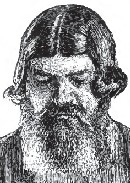 One Sunday, I
entered the room in which they held their meetings. It was
a simple Russian peasant’s parlour [izba : log cabin],
quite filled with benches. The congregation were not yet
assembled, and there were only a few persons in the room.
A stout old peasant with a puffy face (the presbyter, as I
afterwards learned) addressed me in these words: ‘If you
please, little father, take a seat nearer to me, and let
us have a talk.’ While I exchanged the usual greeting with
those who were sitting near the worshippers assembled, and
the room became hot and close. One Sunday, I
entered the room in which they held their meetings. It was
a simple Russian peasant’s parlour [izba : log cabin],
quite filled with benches. The congregation were not yet
assembled, and there were only a few persons in the room.
A stout old peasant with a puffy face (the presbyter, as I
afterwards learned) addressed me in these words: ‘If you
please, little father, take a seat nearer to me, and let
us have a talk.’ While I exchanged the usual greeting with
those who were sitting near the worshippers assembled, and
the room became hot and close.The presbyter (i.e. the teacher) sits in the place of honour in the higher corner under the icon-cupboard, which is covered with a curtain. As the Molokanes have no icons, they use the cupboard as a receptacle for books and other articles paper, inkstand, bills, candlesticks, and other church and house furniture. At service- time the books are laid on a small table which is covered with a white cloth and placed, according to the Russian custom, in the same high corner. By the presbyter sits his assistant or assistants. Bound the table are seated on benches the more venerable of the men; the younger men farther back. The women also do not press to the front, but seat themselves mostly by the door and in the corners. ‘Why do the women with you sit behind the men?’ I asked afterwards when we were conversing. ‘Because they are inferior to the men in dignity, little father,’ answered several speakers at once, and proceeded to quote texts in support of this view. Till prayers begin, the assembled worshippers converse on all sorts of topics, and most of them sit in coats trimmed with fur in spite of the terrible heat and closeness of the room. Then the presbyter raises his voice: ‘What shall we read to-day? I never was a good reader, and my eyes are weak now. You read, brother Ivan Vlassyitch.’ ‘No, no, Jakoff Nikiforovitch (Jacob son of Nikifor); how could I come up to you? You must read. ‘Perhaps I might, but my eyes are weak. ‘Never mind; read us something from the Apostle John.’ After this little piece of affectation, which was probably occasioned by the presence of a stranger, he placed his spectacles on his nose and began to read from the Epistle of John, stopping to explain every phrase, His commentaries were often very arbitrary, but, again, were sometimes distinguished by sound practical sense. For instance, one of his explanations ran as follows: ‘See, brethren, the Apostle forbids strife; but among us the day before yesterday the lads fell out in the hayfield, and then went to the assessor of the court to make complaint. Now that is not what the Apostle bids us do. If you fall out, go to the elders; they will settle the matter, reconcile the disputants, make them kiss one another, and so an end of the business. But you take it into your heads to go and trouble the assessor; that is a sin. Now let us go on.’ At certain passages, where, I suppose, he was doubtful about the meaning, he would evade an explanation by such phrases as ‘This again the Apostle does not bid us do,’ or ‘You must bear this in mind, and not forget it.’ The words of the Apostle about the future kingdom of God the presbyter explained as follows: ‘When it will come no one knows, and it may be that our grandsons will not live to see the second coming of Christ.’ When he had finished the chapter from the Apostle he called upon the congregation, ‘Now, children, sing something.’ The congregation at once became animated. One of the presbyter’s assistants opened the Psalter, and, when he had in conference with his neighbour chosen a psalm, read out the first verse. The congregation followed him, and began to sing in a strain like our national songs, only still more melancholy. So they went on, verse after verse, one reading it aloud and the others then taking up the words and drawling them out monotonously. The Molokanes sing very loud, and the women’s voices are so shrill that the singing may be heard from one end of the village to the other. On Sunday evenings, when singing was going on in several meetings at once, I often found it impossible to fix my attention on anything. I shut doors and windows, but all in vain: the shrill wail was as penetrating as if the singers had been close under my window. After the singing a small carpet was spread; the people placed themselves round it and prayed, some standing, some on their knees; the presbyter in a loud voice, the rest whispering. Then they took their places on the benches again and sang once more. Now followed the ceremony of kissing. All ranged themselves in the room in a circle, and each in turn, John or Peter, went the round, bowing low to each person in the circle and kissing him twice. The presbyter alone received the salutation without bowing. Among the Duehobortzis it is the custom for the men to kiss only the men, and the women only the women; but among the Molokanes the custom is different men and women kiss each other. The men, however (probably because they count themselves superior), take the initiative. The singing is continued all through this ceremony; then follows another prayer, then singing again, and then at last the concluding prayer. At the end of the service the presbyter generally invites the congregation in the following terms: ‘To-morrow, brethren, come together again in the afternoon that we may pray to the Lord our God.’ Here I may mention a beautiful custom of which I have not yet spoken. During the service those who come late do not enter the room singly, but in groups, availing themselves of a pause between the singing and the reading. They remain standing by the door, and softly murmur prayers, to which the others, rising from their places, respond in similar fashion. Then they exchange bows and the service resumes its course. During the reading and expounding of the Scripture by the presbyter, his assistants supplement his remarks by further explanations, the congregation putting questions if there is anything they do not understand. A passage being read in which baptism was mentioned, I asked, ‘Why do the Molokanes not baptize with water, though Christ gave an example in His own person and was baptized by John?’ ‘That is true,’ was the answer; ‘but He did that only for discipline. What say the Scriptures, little father? John the Baptist says, ‘I baptize you with water: but One cometh after me whose shoe-latchet I am not worthy to unloose; he shall baptize you with water and fire. ‘If, then, we are to undertake the water-baptism we must also undertake the fire-baptism. Now tell us, if you please, what is to be made of that.’ The texts which the Molokanes choose for instruction show that they lay great stress upon the Christian dogma which teaches that God’s grace is infinite, and that every sin of word or deed may be expiated by repentance. Nay, they go further and say, ‘If you sin not, you do not repent; if you repent not, the Holy Ghost has no part in you, and you are not saved. It is not till the moment of repentance that the Holy Ghost we long for comes to a man.’ Among the pure Molokanes there is no outward and visible sign of the process; the happy one only heaves a sigh and begins to weep when he feels his sorrow lightened by prayer. Among the Leapers [Pryguny], on the contrary, the repentant sinner, when he feels the Holy Spirit coming upon him, counts it his duty to manifest his inspiration. He begins to twitch and to tremble as if he were drunk; then all the company begin to beat with their feet, to skip, to spin round, to leap on the benches, and even on the tables; some seize hold of the table and drag it about the room. Men and women rave together, only the women still more wildly than the men. This enthusiasm is to some extent intelligible when we consider that the Leapers are mostly young people whose natural impulses are cruelly suppressed by the Puritanical rules of the sect, forbidding all expression of worldly joy, such as singing and dancing. However this may be, at any rate they compensate themselves in full for the deprivation. Moreover, the prayer- meetings of the Molokanes last an enormous time. Their evening meetings go on continuously for four or five hours, and even longer; and all this in a hot and close atmosphere, in the middle of the night, and after the hard labour of the day. Under such circumstances, it is easy, not merely to forget yourself for a moment, but altogether to lose your senses. It was already past midnight when I entered the meeting house of the Leapers. The atmosphere of the room, which was almost dark, reminded one of a bath-room; one dripping candle was the only light. The worshippers lay on the floor, packed close together, with their faces downwards; only the presbyter stood, with folded hands, and his head bowed upon his breast, praying in a low voice. His tones are solemn and the words distinctly audible: ‘Lord, be gracious; Lord, be gracious. Honour be to the Father, the Son, and the Holy Ghost.’ For want of space some are standing upon the benches, leaning against the wall as if exhausted, but with their arms extended and their heads raised. One man who is standing on a bench has pressed his face into the corner, and is weeping gently but bitterly. Now and again sighs are heard from the middle of the throng, and even articulate words: ‘Why dost thou punish me, Lord? Why do they smite me? They themselves know not.’ At another passage, one bursts out weeping and sobs for a long time. Suddenly one leaps up from the ground into the air, raises his hands and head, and stands as if entranced; he finds himself in a state of repentance, and declares his readiness to fly to Sion; only he still lacks the wings. These devotions went on for more than an hour in my presence, and then all rose up almost at the same instant and sang new songs, at first quietly enough, but gradually the time became quicker and quicker, and their bodies began to move in a more and more animated manner. Suddenly a young fellow, who till now had been standing quiet, stamped madly with his feet, shook his head, and reeled from side to side. I thought the lad must fall; but he not only did not fall, but executed with his feet and his whole body a variety of elaborate movements. Presently the whole meeting was in a state of ecstasy. The air was filled with loud groans. They leaped; they beat the ground with their feet; the women whimpered; all gesticulated with their hands, and their faces assumed a wild expression. I squeezed myself into a corner and looked on, not without anxiety: every moment I expected some one would be hurt. At last a hand knocked the candle off the table and the room became quite dark; however, the candle was lit again at once. As an overwhelming argument in justification of their ecstasies at prayer* the Pryguny [* It appears that V.V.V. at times confused Molokane with Leapers/Pryguny, or combined them.]
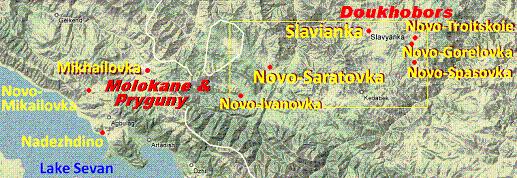 Novo-Saratovka is 20 km (12 miles) southwest of Slavianka, and 30 km (19 miles) by road. Area in yellow rectangle is enlarged below. 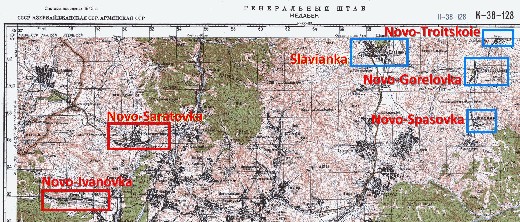 Village Name Changes Throughout the history of the Caucasus, boundaries and names changed after wars and governments conquered territory. Some places were founded centuries ago, and some by the recently relocated Spiritual Christians. Some places changed names many times, some having 2 names, while other place names never changed. Spelling variants in different languages, dialects and territory rule also add to the confusion of finding a place. The maps and table show names used in the 1840s.
I have already mentioned that among the Leapers there are elect persons, who, being inspired by the Holy Ghost, are supposed to speak in various languages. I had no opportunity of hearing this speaking with tongues myself; but others who had heard it told me that it is nothing but silly gibberish, as, indeed, with people who can scarcely read, it could not fail to be. ‘How can you check them,’ I asked, ‘since none of you knows any other language—not even Tartar or Armenian? They may talk any nonsense they please before you.’ ‘Quite true; but when the Holy Ghost inspires a man he can speak any language, since God has given him the power.’ They explain, I may observe, that these speakers with tongues will be needed when the kingdom of Sion is established, embracing many peoples, among whom the [Leapers / Pryguny] 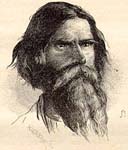 ‘Mount Sion (Rev.
xxi.) [Откровение
21] is the eternal Sion ; but besides this there is
a visible Sion (Rev.
xx.) [Откровение
20], a kingdom of the people of God, where Christ
Himself will reign. When this kingdom will be established
is not yet known; but its establishment is certain; it is
also the fact that only the elect will enter it. Round
about this Sion will lie the New Jerusalem, full of all
sorts of people of different races and tongues.’ ‘Mount Sion (Rev.
xxi.) [Откровение
21] is the eternal Sion ; but besides this there is
a visible Sion (Rev.
xx.) [Откровение
20], a kingdom of the people of God, where Christ
Himself will reign. When this kingdom will be established
is not yet known; but its establishment is certain; it is
also the fact that only the elect will enter it. Round
about this Sion will lie the New Jerusalem, full of all
sorts of people of different races and tongues.’In this connection I may give the following story. ‘One evening,’ said my informant, ‘as I entered the meeting-room of the Leapers, I noticed something moving about in the dark on the top of the stove. I looked closer, and perceived that it was a very stout old peasant, quite naked*, who kept turning himself from side to side. I thought he was a lunatic, but it was pointed out to me that feathers were growing upon him.’ [* There could be a historic connection with Svobodniki, Freedomits, later called Sons of Freedom, a group of zealous protestors who split from Canadian Doukhobors, sensationalized in media first for nude protests, then arson.] ‘What does that mean?’ ‘It means that he is set free from his sins and is now praying to God for wings to fly to Sion.’ I told this story to some of the teachers of the Leapers; but they only laughed and repeated their usual phrase: it was a spiteful invention. ‘Certainly,’ they added, ‘it does sometimes happen that a man who feels the Holy Ghost in him will raise his hands as if he were preparing to fly away whither the Lord directs him from this world of sin; but it is not true that he will strip his clothes off.’ The raising of the hands I often witnessed, and could not but ask myself in astonishment how they could maintain this posture for nearly an hour without exhaustion. [It appears that V.V.V. at times confused Leapers/Pryguny with Molokane who do not jump, or combined them.] The Molokanes assert that the sins of a brother who does not repent are invariably revealed by the Holy Ghost during prayers to one of the congregation: he informs the presbyter, and the offender is then admonished before the congregation. These cases, they said, are of frequent occurrence. When an offence has been committed, they punish the offender according to the decree of his offence, by excluding him from the ceremony of kissing, or even altogether forbidding him to attend the meetings. He who wishes to join the community of the Leapers must first express his penitence before the presbyter, and promise that he will in future, to the best of his ability, abstain from all sin. Then the presbyter at the next meeting announces: ‘M. or N., brethren, expresses his penitence, and prays to God for the Holy Spirit.’ In order to help the new member to obtain this benefit, the ‘holy choir’—i.e. all those who have already expressed their penitence and received the Holy Ghost—lay their hands upon him after the example of the Apostles, and bestow upon him a visible token, viz. a girdle, which he thenceforth constantly wears. The customs of the Molokanes are very simple. For a baptism they meet together, read and say prayers, sing, and give the infant a name—generally that of the saint on whose festival it was born. The marriage ceremony consists in reading prayers, singing psalms, and blessing by the parents; the bride is then given away and the business is over. After the ceremony follows, according to the Russian custom, an entertainment, more or less sumptuous, according to the condition of the couple. Their dead they place in coffins and bury with their own hands. The Molokanes profess to use neither alcohol nor tobacco, which they call Devil’s incense. In secret, however, they indulge in both, especially in brandy. It is said against the Molokanes that they are sly and given to intrigue. A hasty acquaintance with them certainly suffices to show that they are not nearly so honest as their neighbours the Duchobortzis. I often heard them complain about lack of land and other inconveniences, though they live in a sufficiently comfortable manner, and seem to have no ground for discontent. Many of the Molokanes are dealers in raw products, and not a few are engaged in the carrying trade between Tiflis and various towns of Transcaucasia. It is to be remarked that nearly all the Molokanes can read. The Molokanes were removed to Trans-caucasia about twenty-five or thirty years ago by order of the Government. They are now permitted to return to their homes; but the conditions on which they may return are not yet settled, and they do not yet know how much land and stock will be assigned to them; and so for the present the maintain a very cautious attitude, and are in no haste to move. But it is safe to assume that if land enough be given them many will leave Trans-caucasia, where they are unable to make themselves at home. It is plain that they have no particular affection for the mountains. ‘How can you compare the two countries?’ you hear them say. ‘There, all plain; here, nothing but these giant mountains.’ ————— His next trip was 2 years later in 1887 through Central Asia.
Alternate spellings: Vassilii / Vasili / Vasilii Vasilievich Verischagin / Vereshchagin / Verestchagin / ... SOURCES USED and MORE:
|
